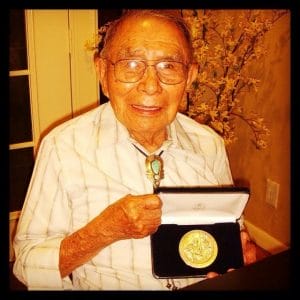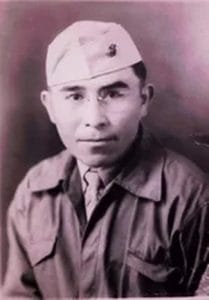In 1943, Begaye dropped out of high school to join the U.S. Marine Corps for World War II, and was put to work on an interesting assignment: Navajo-born servicemen got together in classes to develop a code to help the military communicate without their messages being intercepted. The Navajo language didn’t have military terms in its vocabulary, so the men agreed on specific meanings of hundreds of words from their native language. For instance, “battleship” would be lo-tso (“whale”), a “division” would be ashih-hi (“salt”), and “armor” would be besh-ye-ha-da-di-teh (“iron protector”). To communicate concepts that couldn’t be pre-planned, they came up with other Navajo words to represent all the letters of the alphabet, so any message could be spelled out. Because of this, even other native Navajo speakers who didn’t go through the training would not be able to decipher their messages.

Obviously, then, when sending messages over open airwaves the Navajo Code Talkers completely perplexed the Japanese: their code was the only spoken military code never broken, and the program wasn’t even declassified until 1968. “Were it not for the Navajos,” said 5th Marine Division signal officer Maj. Howard Connor, “the Marines would never have taken Iwo Jima.” During his service, Begaye was wounded so severely he spent a year in the hospital, and was discharged in 1945. Upon returning home to Arizona, Begaye opened the Begaye’s Corner Trading Post in Chinle, eventually expanding it to several shops. After closing that down in 1998, he concentrated on farming, growing fruit trees and raising cattle and sheep. Most of his proceeds went to help others, says his granddaughter, Theodosia Ott: “He was always a person that would give you the last penny he had in his pocket.” Each Thanksgiving, she remembers, “we always had, like, three turkeys.” When a homeless person would approach the house, “he would always tell us, ‘Go fix them a plate so they have something to eat. They’re somebody’s children too.’” Ott asked him if he was ever afraid during the war. Yes, he said, but “there was no other choice. We had to make sure that everyone in the U.S. was safe.”

“What we did truly represents who we are as Americans,” said Peter MacDonald Sr., spokesman for the remaining Code Talkers and, at 90, the youngest of them. “America, we know, is composed of diverse community. We have different languages, different skills, different talents, and different religions. But when our way of life is threatened, like the freedom and liberty that we all cherish, we come together as one. And when we come together as one, we are invincible.” With Begaye’s death in Chinle on May 10 at 97, only seven of the more than 400 World War II Code Talkers survive.
